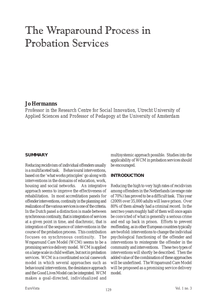Samenvatting van de kwantitatieve resultaten van het proefschrift Certificering, accreditatie en de professional
DOCUMENT
Lifestyle related health problems are a tremendous burden for European societies that demands a shift towards prevention and a professional to guide this process. Therefore a new bachelor program PALC was developed. A consortium of seven universities from the Netherlands, Denmark, Portugal, Italy, Lithuania and Great Britain developed a competence-based curriculum. Six semesters were developed: 1) Basic Program, 2) Health Enhancing Physical Activity (HEPA), 3) Changing Behaviour, 4) Nutrition, 5) Policy & Entrepreneurship and 6) the Final Project. From 2012-2013, Changing Behaviour, HEPA and Nutrition were tested. Meanwhile, Portugal received full accreditation and Lithuania started the accreditation process. From September 2013, the program will start in Groningen/NL, Rio Maior/POR and Kaunas/LIT.
DOCUMENT

Article written by Sue Lawrence and Nol Reverda, Directors of the Macess programme. The validation of awards and courses within higher education has traditionally and, to a great extent, continues to be a national issue, with each country using its own protocol for determining standards and academic levels, and validating courses according to its nationally recognised and agreed system. Institutions in some countries, however, are able to validate courses which are delivered in an institution in another country. This practice has led to some useful collaborative arrangements in developing European postgraduate programmes for the social professions, particularly in countries where education for social professionals takes place outside of the university system, for example, in The Netherlands. Largely as a result of such collaboration, facilitated by the Erasmus programme, there is now a proliferation of courses for social professionals, which have ‘European’ in their title or as a major component of the course content. What, then, makes a programme ‘European’?
DOCUMENT

Reducing recidivism of individual offenders usually is a multifaceted task. Behavioural interventions, based on the ‘what works principles’ go along with interventions in the domains of education, work, housing and social networks. An integrative approach seems to improve the effectiveness of rehabilitation. In most accreditation panels for offender interventions, continuity in the planning and realization of the various services is one of the criteria. In the Dutch panel a distinction is made between synchronous continuity, that is integration of services at a given point in time, and diachronic, that is integration of the sequence of interventions in the course of the probation process. This contribution focuses on synchronous continuity.
DOCUMENT

Lifestyle related health problems are a tremendous burden for European societies that demands a shift towards prevention and a professional to guide this process. Therefore a new bachelor program PAL was developed. A consortium of seven universities from the Netherlands, Denmark, Portugal, Italy, Lithuania and Great Britain developed a competence-based curriculum. Six semesters were developed: 1) Basic Program, 2) Health Enhancing Physical Activity (HEPA), 3) Changing Behaviour, 4) Nutrition, 5) Policy & Entrepreneurship and 6) the Final Project. From 2012-2013, Changing Behaviour, HEPA and Nutrition were tested. Meanwhile, Portugal received full accreditation and Lithuania started the accreditation process. From September 2013, the program will start in Groningen/NL, Rio Maior/POR and Kaunas/LIT.
DOCUMENT

Dissertatie met als onderwerp het ontwerp en evaluatie van de Hogere Beroepsopleidding Orthopedische Technologie in Nederland. In deze dissertatie wordt naast het ontwerp van de opleiding ingegaan op een vergelijking die is gemaakt met andere opleidingen op het gebied van hoger orthopedisch technologisch onderwijs in de wereld.
DOCUMENT

DOCUMENT
Research has shown that it is difficult to motivate professionals to contribute to certification. Little research has been done on the reasons why. The paper provides more insight into the difficulties that organizations face to commit their professionals to become involved in certification and turns these into requirements to be fulfilled to achieve commitment. These are relevant for organisations, which need the support of their professional employees to achieve management system certification.
DOCUMENT
Kwaliteit vraagt om vertrouwen en vakvolwassenheid van de professional.
DOCUMENT
